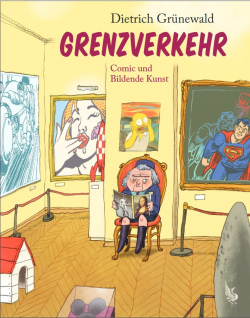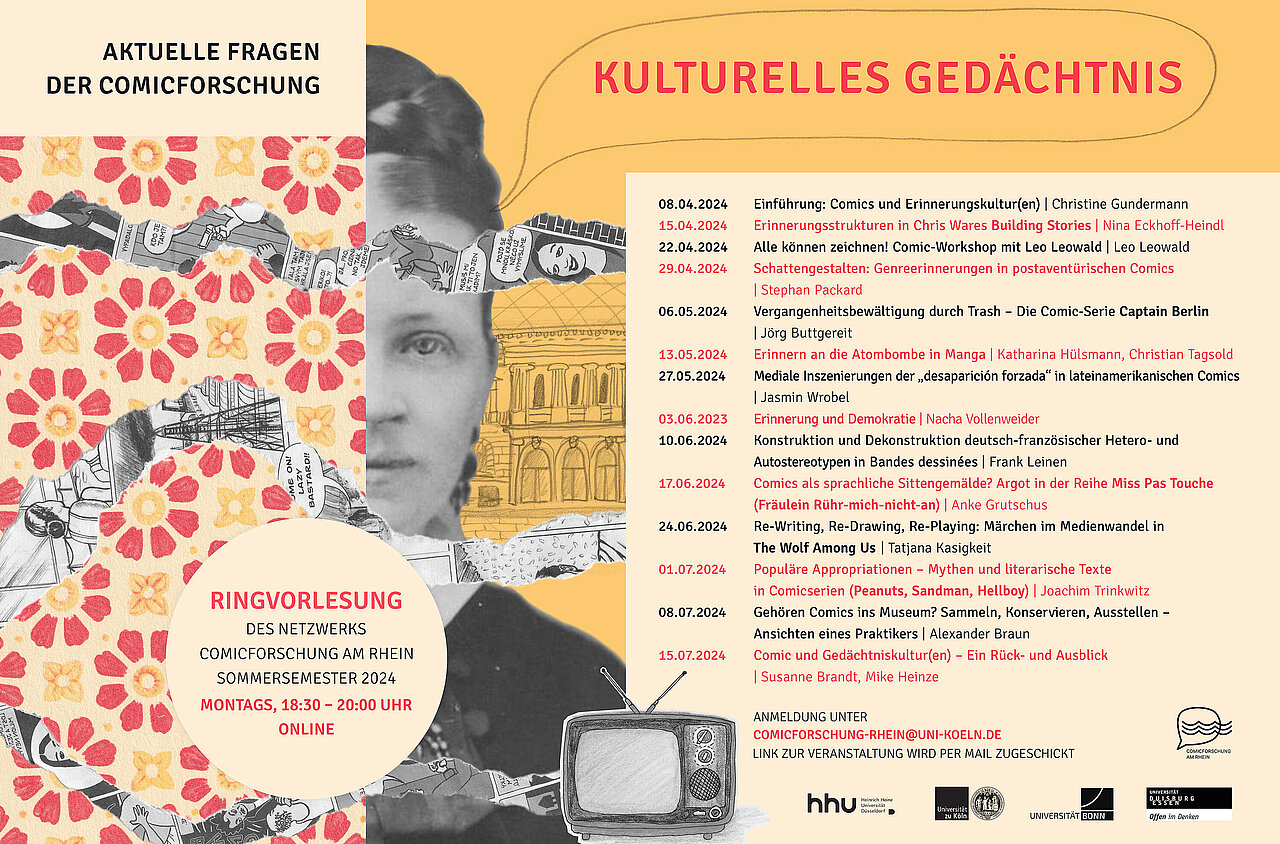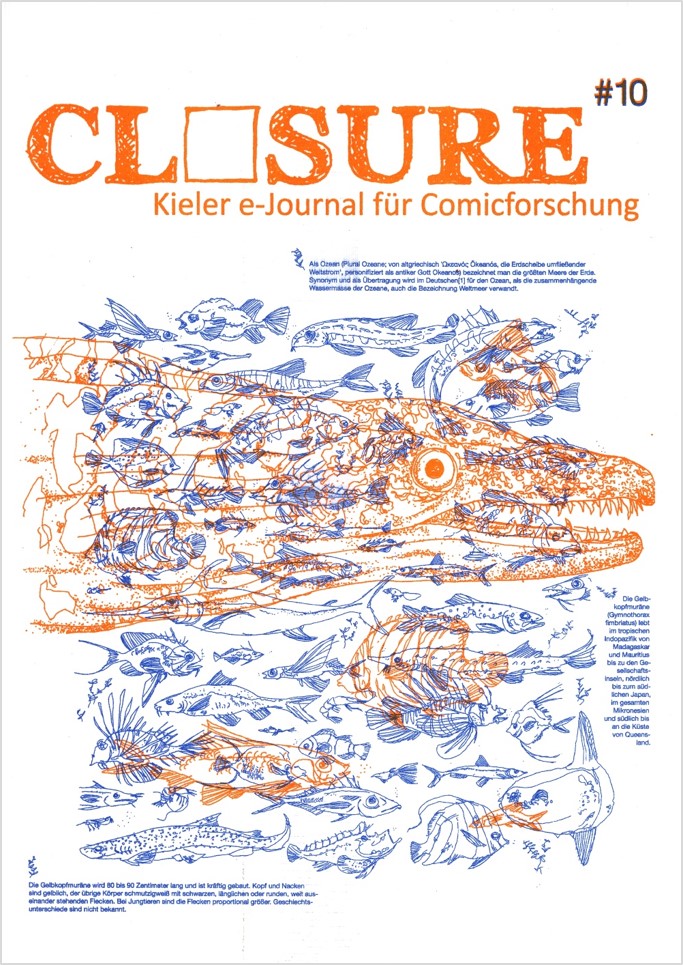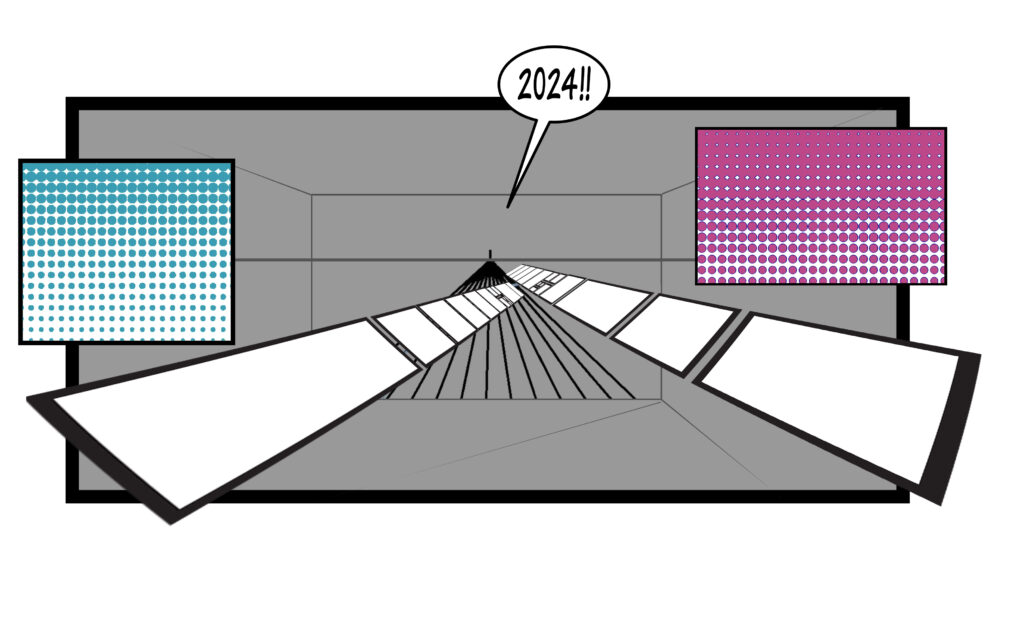Wie in der Vergangenheit sammeln und archivieren wir auch im aktuellen Sommersemester wieder comicrelevante Lehrveranstaltungen unserer Mitglieder.
Wenn Sie noch einen Kurshinweis ergänzen möchten, auch wenn Sie kein ComFor-Mitglied sind, schreiben Sie bitte eine E-Mail mit allen relevanten Daten an die Webredaktion: redaktion@comicgesellschaft.de.
| Name der/des Dozierenden | Arnold Bärtschi |
| Universität/Hochschule | Ruhr-Universität Bochum |
| Titel der Lehrveranstaltung | Liebe und Leidenschaft in Antike und Comics – Sachübung Altertumskunde (inkl. Optionalbereich) |
| Art der Lehrveranstaltung | Übung (hybride Zuschaltung möglich) |
| Fachliche Anbindung | Klassische Philologie, geöffnet für alle Fächer |
| Kursbeschreibung | Liebe und Leidenschaft waren in antiker Literatur seit ihren Anfängen von zentraler Bedeutung und prägten sowohl Motive und Erzählstrukturen wie den Mythos zum Trojanischen Krieg als auch ganze Gattungen wie die römische Liebeselegie. Dabei boten unterschiedliche Textformen verschiedene Möglichkeiten an, um die gesellschaftliche Stellung und Einbindung von Liebe in all ihren Erscheinungsformen zu thematisieren und kritisch zu beleuchten: Die griechische Knabenliebe, die matriarchale Gesellschaft der Amazonen oder der Sexstreik der Lysistrate sind nur drei Aspekte dieses vielseitigen Diskurses. Gerade Comics, die sich durch ihre charakteristische Verbindung von Bild und Text zur einer sequenzialen Erzählung auszeichnen, stellen vor diesem Hintergrund ein besonders reizvolles Medium zur Rezeption antiker Liebe dar. Dies gründet sich nicht nur in einer Vielzahl innovativer visueller Erzählmittel, sondern auch in zahllosen Anschlussmöglichkeiten an zeitgenössische Debatten und Diskurse. Dieser vielseitigen Rezeption wollen wir in dieser Lehrveranstaltung im gemeinsamen Dialog nachspüren, indem wir die Entwicklung des Mediums in verschiedenen zeithistorischen Kontexten nachverfolgen, eine Vielzahl an Comics mit antiken Themen in Auszügen betrachten und unter Zuhilfenahme verschiedener Interpretationsansätze in einen Dialog mit antiker Literatur und Kultur bringen. |
| Name der/des Dozierenden | Imke Heine |
| Universität/Hochschule | Technische Universität Dresden |
| Titel der Lehrveranstaltung | Die Welt in Bildern erklären: Narrativer Wissenstransfer in der Bande Dessinée |
| Art der Lehrveranstaltung | Seminar |
| Fachliche Anbindung | Französische Literatur- und Kulturwissenschaft |
| Kursbeschreibung | Ursprünglich stark mit frankobelgischen Titeln wie Astérix und Tintin assoziiert, entwickelt sich im Bereich des frankophonen Comics spätestens seit den 1990er Jahren eine zunehmende Bandbreite an erzählerischen Formen. Eine aktuelle Tendenz geht zu einer Bande dessinée mit didaktischem Anspruch: Französischsprachige Sachcomics (BD documentaires, BD pédagogiques oder auch BD de vulgarisation genannt) sehen sich an der Schnittstelle von Kunst, Narration und Wissensvermittlung. Doch Autor:innen wie Catherine Meurisse, Marion Montaigne, Lou Lubie oder Blanche Sabbah bieten nicht nur einen humorvollen Einblick in vielfältige Wissensbereiche, sondern reagieren in ihren Arbeiten auch auf öffentliche Debatten. Welche Strategien des Informationstransfers werden dabei verfolgt? Inwiefern werden Wissensdiskurse dekonstruiert und neu gedacht? Welche Rolle spielen Erzählperspektiven? Das Seminar beschäftigt sich einführend mit der Geschichte und den Besonderheiten des Mediums Comic, um sich im Anschluss exemplarisch mit einer Auswahl an Werken unter kultur- und literaturwissenschaftlichen Gesichtspunkten auseinanderzusetzen. |
| Name der/des Dozierenden | Helene L. Bongers |
| Universität/Hochschule | Universität Potsdam |
| Titel der Lehrveranstaltung | Comicbilder einer Ausstellung – Museumscomics im Fokus |
| Art der Lehrveranstaltung | Seminar (Master) |
| Fachliche Anbindung | Master Angewandte Kulturwissenschaft und Kultursemiotik |
| Kursbeschreibung | Museumscomics boomen seit der Jahrtausendwende: immer mehr Museen schmücken sich mit eigenen Comicreihen und auch unabhängige Comickünstler*innen behandeln die Institution „Kunstmuseum” in ihren Werken. In diesem Seminar betrachten und analysieren wir gemeinsam Comics in deutscher, englischer (und in Einzelfällen auch französischer) Sprache, die sich auf unterschiedlicher Art und Weise mit dem Kunstmuseum auseinandersetzen. Dabei lernen wir die Grundlagen der Geschichte des Comics und der Institution Museum kennen, erlernen Grundlagen der interdisziplinären Comicanalyse, untersuchen die spannungsreiche Beziehung zwischen Comics und Kunst und kreieren unseren eigenen kleinen Museumscomic. |
| Name der/des Dozierenden | Christina Meyer |
| Universität/Hochschule | Universität Hamburg |
| Titel der Lehrveranstaltung | Graphic Literature |
| Art der Lehrveranstaltung | Blockseminar (22.-26. Juli 2024), ganztägig |
| Fachliche Anbindung | Anglistik und Amerikanistik |
| Kursbeschreibung | Link zur Veranstaltung |
| Name der/des Dozierenden | Netzwerk ‚Comicforschung am Rhein‘ |
| Universität/Hochschule | Bonn, Bochum, Düsseldorf, Essen, Köln |
| Titel der Lehrveranstaltung | Aktuelle Fragen der Comicforschung: Kulturelles Gedächtnis |
| Art der Lehrveranstaltung | Online-Ringvorlesung |
| Fachliche Anbindung | Interdisziplinär |
| Kursbeschreibung | Die gemeinsam von den Universitäten Bonn, Düsseldorf und Köln und dem Netzwerk Comicforschung am Rhein getragene interdisziplinäre Ringvorlesung zur Comicforschung beschäftigt sich in diesem Sommer mit der Stellung des Comics im kulturellen Gedächtnis sowie dem Gedächtnis des Comics als medial vermittelter Kunstform.
Anmeldung unter comicforschung-rhein@uni-koeln.de |
| Name der/des Dozierenden | Elissa Pustka |
| Universität/Hochschule | Universität Wien |
| Titel der Lehrveranstaltung | Le langage des jeunes dans la bande dessinée |
| Art der Lehrveranstaltung | Master-Seminar |
| Fachliche Anbindung | Romanistik: Sprachwissenschaft |
| Kursbeschreibung | «Je vous rassure, les racailles, c’est pas qu’en banlieue ou chais pas, y en a plein mon collège et c’est des gosses de riches»: comprenez-vous le langage des jeunes? Dans ce séminaire, vous allez le décrypter – et vous allez apprendre qu’il ne s’agit pas d’un ‘code secret’, comme il est souvent présenté dans les médias. L’analyse linguistique révèle que beaucoup de traits du prétendu ‘langage des jeunes’ correspondent tout simplement à du français parlé (par ex. «c’est pas» au lieu de «ce n’est pas» et «y a» au lieu de «il y a» dans la citation en haut). De plus, cette citation ne provient pas d’un.e adolescent.e, mais de l’auteur de bande dessinée Riad Sattouf, né en 1978. Il met ces mots dans la bouche d’Esther, 13 ans, dans la série «Les Cahiers d’Esther» (vol. 4, p. 53). Cette mise en scène est un aspect très important du ‘langage des jeunes’: en effet, il ne s’agit pas de la langue que tous les jeunes parlent toujours, mais d’une représentation sociale. Dans ce séminaire, nous prendrons d’abord petit à petit connaissance des publications scientifiques sur le langage des jeunes et le langage de la bande dessinée et vous écrirez un résumé de l’état de l’art. Ensuite, nous allons discuter les hypothèses formulées dans le discours scientifique avec des spécialistes internationaux lors de deux journées d’études le 16 et 17 mai. Ensuite, vous allez concevoir votre propre projet de recherche et étudier un questionnement qui vous intéresse dans un corpus de bandes dessinées ou de romans graphiques récents, p. ex. «Les Cahiers d’Esther» de Riad Sattouf (2016-2024), «Pucelle» de Florence Dupré la Tour (2020), «Adoleschiante» de Marie Donzelli et Mademoiselle Caroline (2020), «Nowhere girl» de Magali Le Huche (2021), «Les Strates» de Pénélope Bagieu (2021) ou «La distinction» de Tiphaine Rivière (2023). Vous allez recevoir un premier feedback sur vos exposés par les autres participant.e.s du séminaire et de la part de l’enseignante et ensuite rédiger de manière autonome votre mémoire de séminaire. |
| Name der/des Dozierenden | Janek Scholz |
| Universität/Hochschule | Universität zu Köln |
| Titel der Lehrveranstaltung | Comicproduktionen der portugiesischsprachigen Länder Afrikas |
| Art der Lehrveranstaltung | Vorlesung |
| Fachliche Anbindung | Romanistik / Portugiesisch-Brasilianisches-Institut |
| Kursbeschreibung | Comicproduktionen aus den sechs portugiesischsprachigen Ländern Afrikas werden in der internationalen Comicforschung bislang kaum wahrgenommen. Dabei lassen sich spätestens seit der Zeit der Unabhängigkeit in den 1970er Jahren zahlreiche Publikationen ausmachen, die maßgeblich das kollektive Bewusstsein geprägt haben und nach wie vor prägen. Die Vorlesung zeichnet die wichtigsten Entwicklungsschritte in ausgewählten Ländern nach, stellt die zentralen Werke und Protagonist*innen kurz vor und diskutiert die Rolle der lokalen Comicproduktionen bei nation building Prozessen und gesundheitlichen Aufklärungskampagnen. Darüber hinaus wird ein großer Fokus auf den Süd-Süd-Beziehungen liegen, d.h. konkret, auf den Einflüssen aus Lateinamerika, die sich in zahlreichen Comicproduktionen der portugiesischsprachigen Ländern Afrikas bemerkbar machen (z.B. der kubanische Einfluss auf Comics in Angola und Mosambik). |

 Das Netzwerk ‚Comicforschung am Rhein‘ veranstaltet auch in diesem Semester wieder eine Ringvorlesung zur Comicforschung. Das Thema lautet diesmal: „Kulturelles Gedächtnis im Comic.“ Lehrende der Universität Bonn, Universität zu Köln, Universität Düsseldorf und Universität Duisburg-Essen organisieren gemeinsam diese Veranstaltung, die immer montags von 18.30 bis 20 Uhr online über Zoom stattfindet. Studierende können sich über ihre lokalen Universitäten anmelden. Anmeldungen von Externen nehmen wir unter der Mailadresse von
Das Netzwerk ‚Comicforschung am Rhein‘ veranstaltet auch in diesem Semester wieder eine Ringvorlesung zur Comicforschung. Das Thema lautet diesmal: „Kulturelles Gedächtnis im Comic.“ Lehrende der Universität Bonn, Universität zu Köln, Universität Düsseldorf und Universität Duisburg-Essen organisieren gemeinsam diese Veranstaltung, die immer montags von 18.30 bis 20 Uhr online über Zoom stattfindet. Studierende können sich über ihre lokalen Universitäten anmelden. Anmeldungen von Externen nehmen wir unter der Mailadresse von 
